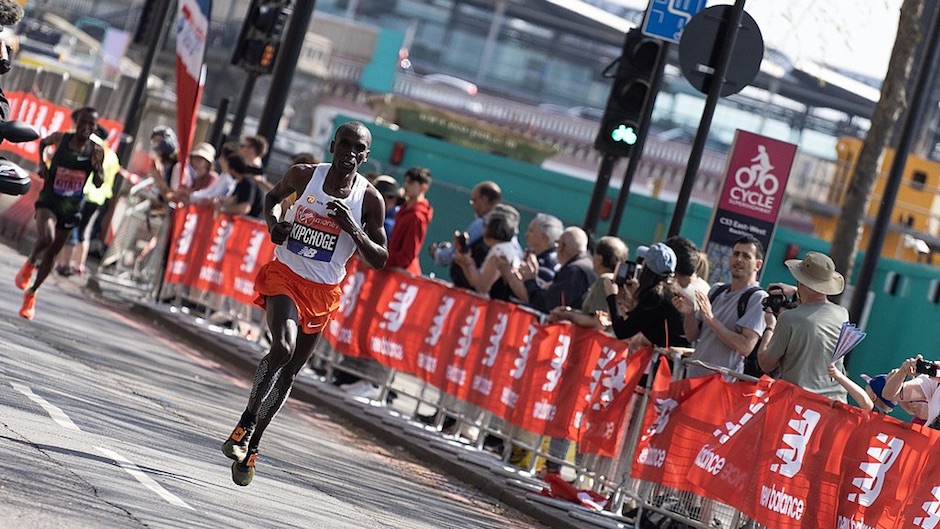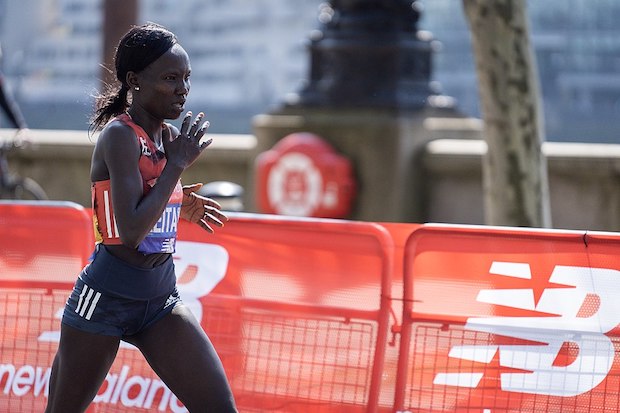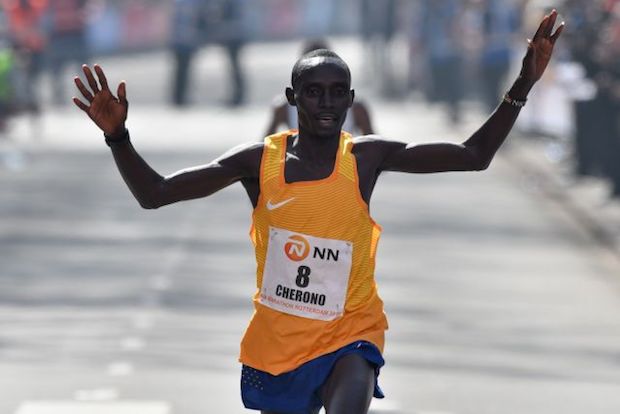Although it is an issue largely unnoticed by the media, many elite Kenyan runners openly talk about their Christian faith as the reason for their success.
 Eliud Kipchoge running the 2018 London Marathon. / Paul Hudson, Wikimedia Commons.
Eliud Kipchoge running the 2018 London Marathon. / Paul Hudson, Wikimedia Commons.
Most of the world's top marathon runners come from an ethnic group, the Kalenjin, which represents 0.06% of the world's population, and from a small town, Iten, which is located in Kenya's Rift Valley and is known as the 'city of the champions'.
This is not surprising since 8 of the 10 fastest long-distance runners in history are Kenyans.
The fastest male athlete to run a marathon in the world, the only one to do so in under two hours, is Kenya's Eliud Kipchoge, in 2018 in Berlin. And the female athlete who holds the world's fastest marathon record is Bridgid Kosgei, also Kenyan, on the Chicago race course.
Coincidence? Take the example of another world-renowned marathon, the Boston marathon, where, since 1988, 20 of the top 25 places in the men's category have gone to Kenyan runners, according to the Boston Athletics Association.
“If you look at it statistically, it sort of becomes laughable”, said David Epstein, a former senior writer at Sports Illustrated. “There are 17 American men in history who have run under 2:10 in marathons. There were 32 Kalenjin who did it in October 2011”.
The 2019 Boston marathon winner, fellow Kalenjin Lawrence Cherono, lamented that journalists never ask him about his Christian faith, he told Religion Unplugged.
The vast majority of these runners have grown up with a Christian worldview, some from Protestantism and others from Roman Catholicism (in Kenya the denominational landscape is very diverse, with churches so large that some political leaders and candidates try to use them as rally venues).
“Kenya is not like Europe or America. Christianity holds us up. We expect miracles. Even runners who do not go to church carry small Bibles around with them and read their Bibles for inspiration. They trust in the God of the Bible”, pointed out John Njoroge Miaka, who won the Madrid marathon in 2000 and the Valencia marathon in 2001.
Eliud Kipchoge, one of the biggest names in athletics today, the only athlete to run a marathon in under two hours, has also testified of his Christian faith.
“Religion plays a very important role in my life. It keeps me from doing things that could keep me from my goals. On Sundays I go to church with my family and I pray regularly, even in the mornings before a race”, explained the Kenyan runner, gold medallist in the marathon at the last two Olympic Games in Rio de Janeiro (2016) and Tokyo (2021).

Many people in Kenya see these runners as contemporary 'heroes of faith'. And not only because of their achievements on the tracks and circuits they compete on.
Their testimony also reaches out to society, where they have an impact with concrete actions that respond to specific needs such as hunger or schooling, among others.
One example is the winner of the 2014, 2015, 2016 and 2018 editions of the New York marathon, Mary Keitany, who, along with her husband and fellow athlete Charles Koech, has built a school in her hometown of Torokwonin. Keitany, who had to leave school as a teenager to work as a cleaner, has expressed her desire to help young children complete their education.
Another example is Wesley Korir, who won the Boston marathon in 2012 and used the prize to set up a foundation that supports 2,000 farmers and pays for the schooling of 300 children.
“If I win a race, those kids go to school next year. If I don’t, they don’t. It’s a very big motivation”, said the athlete, who is now running for a seat in parliament representing the Rift Valley, in an interview with the British newspaper The Guardian.
Lawrence Cherono has also set up a foundation under his own name that works mainly on digging wells in his home village of Eldoret, where there is a lack of clean and sanitised water. The long-distance runner, winner of the Boston and Chicago marathons in 2019, grew up in the Africa Inland Church.

The pastor of Africa Inland Church in Eldoret, David Nganga, has had several elite marathon runners in his congregation at different stages. One of them is Benjamin Limo, the only Kenyan long-distance runner to win a gold medal at the 2005 World Athletics Championships in Helsinki.
Nganga belives that churches should be as intentional in caring for their athlete members after competitions as they are before them. The pastor explains that athletes who return home after winning a competition face a myriad of challenges.
For example, the fact that they have money and the expectations of their communities to receive help from them. Or to start a political career or a business. There are several pressures, says Nganga, that can lead athletes to seek refuge in training camps or move to Nairobi in an attempt to remain unknown.
According to Nganga, “some athletes have not responded well to those challenges. There have been suicides, divorce, separations, polygamy”, but others have wasted all their money on an irresponsible lifestyle.
“How do you handle huge sums of money made in a very short time? How do you handle the temptations of sudden fame and wealth?”, wondered the pastor.
That is why, he stresses, the church has a moral responsibility to the athletes, to continue to pastor them even after their success.

Las opiniones vertidas por nuestros colaboradores se realizan a nivel personal, pudiendo coincidir o no con la postura de la dirección de Protestante Digital.
Si quieres comentar o